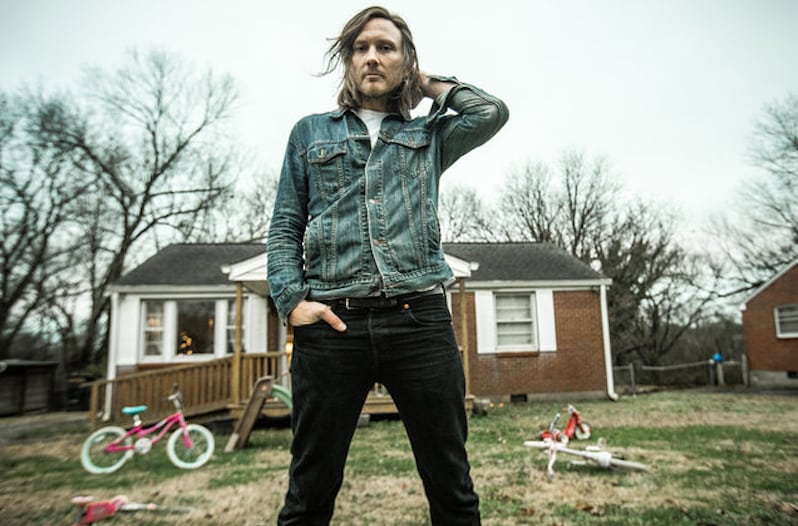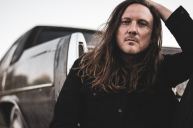"6EQUJ5, is anybody out there alive?" -- Ryan Culwell, "Can You Hear Me"
Videos by Wide Open Country
Since the beginning, mankind has been looking up. A darkened night sky is illuminated by stars and galaxies lightyears away. We've always been looking up at those stars for some kind of response. Looking for some kind of answer. From who? Who knows. Some form of god, some celestial beings, an extraterrestrial intelligence of any kind. Perhaps ourselves.
Ryan Culwell is searching. He's been looking for answers. On The Last American, the Texas native's third full-length album, he opens up with the mysterious 6EQUJ5 followed by "is anybody out there alive?" It works in conjunction with the follow-up "Can You Hear Me," the album's spacey echoed rush and lead single.
To go forward, we must pause for a minute. What does 6EQUJ5 even mean? Well, on August 15, 1977, Ohio State University's Big Ear radio telescope received the signal "6EQUJ5" amongst the static. it appeared to have originated from the constellation Sagittarius. The anomaly was discovered by Jerry R. Ehman, an astronomer who circled the six-digits and wrote "Wow!" in the margins. Since then, it's often been dubbed as the Wow! Signal and often been used as support for extraterrestrial life. Since then, there have been many attempts to explain the origins of the signal. Many think it was a manmade (the bouncing of signals off space debris in low orbit) while others believe comets may have been the source. At any rate, no explanation fully satisfies all parties and the sequence—or any sequence for that matter—has been detected since.
It is part of Culwell's call out for help. It's part of his search. He's looking up. Or, perhaps someone is looking down on earth. More than likely though, it's both (this kind of multi-purposed usage frequently in Culwell's songwriting).
Through the sprawl of 80s-era Bruce Springsteen anthemic charges, a flood of haunting pedal effects and Culwell's West Texas textured vocals, he asks a bevy of questions by asking a single straightforward one—can you hear me? It may as well ring on out through the remaining nine songs. It may not be in that exact form, but it's there. Can YOU hear me? There's a communication breakdown bubbling. Can you hear me or are you just waiting for your turn to talk? It may be simple, but it takes time to digest.
"People aren't listening to one another anymore," Culwell tells Wide Open Country. "They're screaming. I think it's because we're not looking at one another's faces anymore. We've pushed away from each other. We're cut off from one another. I don't think that's really us."
With a world feeding off its' own anxieties, fears, and ego Culwell's searching for something more. Before it twists into something it's not, it isn't as though Culwell feels cheated by the system. He isn't jaded by the times. He's not the old man feeling lost or passed by. Rather, the Texas Panhandle native just thinks we can do better. It's that simple and that complex all at once.
The Last American is deeply rooted in Culwell's past and future. It's shaped by his memories growing up in rural West Texas and the legacies left by the generations before him, namely his father and grandfather. Often described as poignant portraits of ordinary Americans, these hard-working blue-collar Americans are indeed Culwells of the past. On the other end of the spectrum, Culwell's work is marked by being a husband and father himself. In both cases, Culwell delves further into the psyche of the lost American dream and how it has impacted three generations.
On the title track, Culwell sings "I got my old man's heart and a broke down Chevrolet." It's melancholy, yet proud. It's pensive and frustrating. It may not add up to much monetarily, but it's still the world. Listen to it on different days of the week while you're driving home from work and you may wind up feeling something different each time.
You can't help but feel that "The Last American" captures the changing of the tide and describes a world fractured by greed. So much of The Last American is shaped by that influx of instability and the uneven turbulence of the times. There's a mounting tension on songs like "Can You Hear Me," the gleaming fuzz "Heaven Everywhere I Go" and There Will Be Bloodesque downward spiral of "Dig A Hole."
"I was talking with someone the other day about his job," says Culwell. "He was talking about a kid who was on the stubborn side. He works really hard and gets the job done. But he's also a bit of an ass. This guy said his boss told him that it's not about who works hard anymore. It's about who doesn't cause trouble. He told him he was living in the past. That version of the oilfield is gone. I think that can be applied across the board. It's not about who works the hard or is the best in their field. It's about who doesn't stir the pot."
They're chaotic, wild and have an unhinged fury to them. They consistently barrel down the highway never letting off the gas as they make sharp turns. It's this strange mix of despair, bitter pessimism (in some cases), creeping doubt and a despondent demeanor.
"It's not a way out there song, 'The Last American,' but it swirls out there a bit," says Culwell. "You don't know what kind of record you're making until you're actually making it. That song was one of the first signposts. There are some hallmarks of what I've done in the past, but it opens up in a new direction. We were breaking out guitars and lots of sound. Sometimes, you go a little too far and then start to reign it in to find those boundaries."
The sonic soundscape ushers in a vibrant world. Culwell's critically acclaimed Flatlands was sepia-toned and brought to life the varying shades of cotton fields, red dirt, and the harshness that comes with living out on the plains and in Dust Bowl towns. Here, he jumps in that broke down Chevy and ushers in a vividly rich palette of oil patch towns, busted bricks of abandoned industrialism parks and the wounds of a crumbling society. It's a collapsing dream and urban decay. Songs sound like oil stains found on suburban driveways. It's the green hues that flicker at certain angles.
Still, it isn't all hinging on cynicism or doubt in the American dream. The Last American isn't about the things we've lost. It's about the prospects of a brighter future. Culwell may take us to the bad side of town with his accurate pictures of the darkened underbelly of industrial America, but it doesn't stay there too long. It isn't Nebraska or The River for too long. Deep down, The Last American is spurred on by Culwell's deep love and passion for America.
If it's one thing Culwell has taught us, it's that when times are turbulent and unnerving, the one constant is family and friendship. Songs like "Moon Hangs Down," "Dog's Ass" and album-closer "Tie My Pillow To A Tree" feel like intimate lullabies, namely because they stem from spontaneous creativity. They are, in essence, lullabies Culwell made up to sing to his daughters before bedtime—"Moon Hangs Down" and "Tie My Pillow To A Tree" at least. The charming "Dog's Ass" references the traditional "Hush Little Baby."
"I tell my kids stories about trolls and them running up into cactuses made out of marshmallows," says Culwell. "Then I sing to them a song and then we pray. We talk about what life's about. It's just something we do. You're not doing it thinking that'll add up to being something we'll record later. You're just telling silly stories and singing sweet songs. Then it somehow ends up on an album. 'Tie My Pillow To A Tree,' that song in particular, I think it's something that'll be passed down through my family. I hope people love it, but really, I've documented it for my family. They can pass it down to their kids."
The Last American was produced by Ethan Ballinger (Lee Ann Womack, Aubrie Sellers), Megan McCormick (Jenny Lewis, Conor Oberst), and longtime Culwell collaborator Neilson Hubbard (Sam Baker, Caroline Spence). Ballinger, McCormick and Culwell began recording songs over the course of the year during off-hours at Zac Brown's Southern Ground Studio in Nashville.
"They kind of wrapped me into the whole thing," says Culwell. "Let's do a couple of songs. I think they knew I was kind of walking on eggshells trying to figure out what the next move was. It's hard to get me to figure that out. I just wasn't sure. On one hand, I thought I was going to make another brooding songwriter kind of thing and on the other, I was thinking 'screw that, let's not ever make anything that sounds like that ever again.'"
In some respects, Culwell threw out the blueprints to Flatlands. As mentioned prior, it's a new canvas in which Culwell and company are painting on with The Last American. It's built around guitars, amps, delay pedals and the vastness of space. Towards the end, once Culwell and company began understanding just what exactly The Last American was, Hubbard was brought into the fold for a series of short bursts to finish the album.
Still, it all hinges on Culwell's uncanny ability to write plainspoken songs that scrape off the layers of spin and warped retellings to get to the core of the matter. He's armed with an endless tackle box of expressions, idioms and a strong word-stock that reminds you of how your grandparents spoke. Like contemporaries such as Jason Isbell, BJ Barham of American Aquarium and John Fullbright, Culwell isn't afraid to pick at the scabs.
Don't just a book by its cover. Songs such as "Fucked Up Too," "Nobody Loves You, and "Dog's Ass" are alluring and sweetly detailed ballads. There's a drunken nature to them that wax and wane in the moonlight. Culwell's West Texan drawl delicately unfold the vulnerable sketches and playful winks. They make you lean in and hear. They aren't about goblins and marshmallow cactuses, but you're enamored all the same.
It's in these quiet moments, where Culwell shines brightest, as a father and family man. Even when he's asking us to ask ourselves if we're really listening to one another and looking towards the heavens for some kind of sign, it's right there in front of him—it's in front of us. The answers to our problems aren't solved by the yearning for some outside intervention. Another 6EQUJ5 doesn't do the trick. They're solved by looking towards those who surround us. You've been holding the keys all along.
"I think we're all feeling pretty alone right now," says Culwell. "It sure feels that way. I don't think that's really us though."
The Last American is available now via Missing Piece Records.




